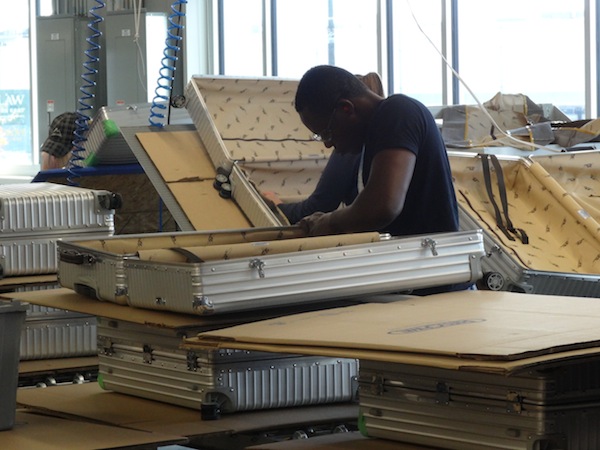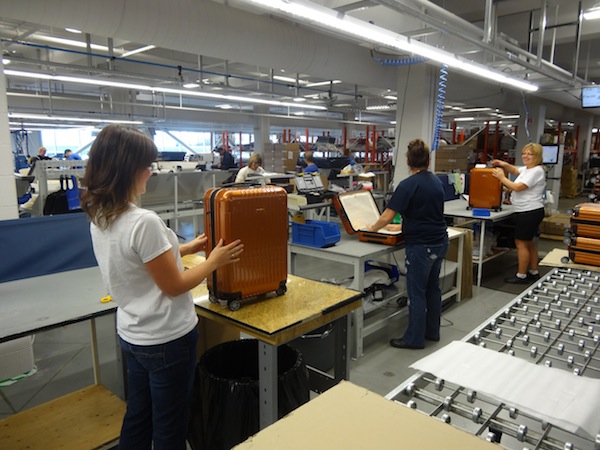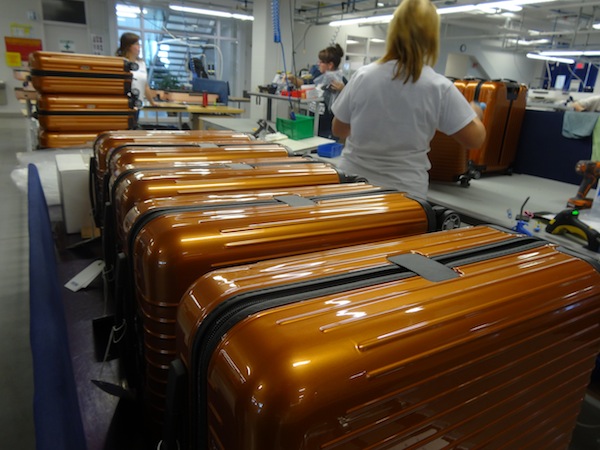I arrived this morning in time to board a bus at the airport for the event I was most looking forward to: a factory tour hosted by Rimowa, known for its stylish and ultra-durable luggage. I’ve always had a fascination with factories, asking my parents to stop here and there on the road trips we took across California. And this was something I could actually buy, unlike an airplane.

Pulling up to the main factory, everyone remarked that it looked a lot like Rimowa’s signature products with silver, ribbed exterior walls. Inside we were treated to a quick lunch and a recap of the company’s history. It’s still family owned and in its third generation despite being founded in Germany in the late 19th century. Talk about tradition! They have several factories throughout the world, but they noted they are the only manufacturer still producing luggage in North America.
But despite being the “largest” luggage factory in North America, it was still a very intimate experience. We had the chance to walk through every step of production for both Rimowa’s aluminum and polycarbonate product lines. Sometimes we were only inches from machinery. And everything we were told emphasized the same message: quality. There were dozens of “defective” pieces in stacks with imperfections so minor it was challenging to spot them. Here are just a few other examples of how serious they are about maintaining their exacting standards:
The aluminum rims that match two halves of each piece are matched throughout production. They’re shaped in Germany, shipped to Canada, and installed together. All the assembly is done by hand.
The finished luggage is undergoes a spin and wobble test to ensure each piece is perfectly balanced. They can adjust them, if necessary, by shifting the zipper by just a few millimeters.
The materials used are extremely robust. Rimowa tested the wheels by dragging them behind a car at 120 miles per hour. (I’m told others on a different tour heard 50 miles per hour. Maybe our guide was exaggerating. Or just used to the metric system.) One of the supervisors stomped on a polycarbonate panel to show it wouldn’t dent or scratch. Some of the loudest noises in the factory were employees pounding on them with hammers to ensure they would still open and close easily.
Rimowa is known for the ribbing of its luggage, a style it copied from some of Lufthansa’s original aluminum aircraft. So the obvious question asked by one person during the tour was, Does this ribbing make the luggage any more durable? Our tour guide couldn’t say anything on the record; the answer reminded me of Francis Urquhart’s favorite line in the original House of Cards: “You might very well think so, but I couldn’t possibly comment.”




Watching the manufacturing process in person certainly made me feel more confident that such an expensive investment would be well worth it. We were told at the beginning that for frequent travelers like us who fly 100,000 to over 300,000 miles a year, “Luggage is an important part of who you are and how you live your life.” Tommy certainly thought so, as he made the pitch for why he loves the Rimowa carry-on he’s used for the last five heres. Here he is showing off how he can pick one up with just a finger!

If you’re interested in making a purchase and want to help a charity at the same time, there are a limited number of a special-edition MegaDO Rimowa carry-ons still available for sale. $200 of every purchase will be donated by Rimowa to MilePoint Cares, and the luggage is so compact it should even fit on most regional jets. The MegaDO special edition is made entirely of polycarbonate, which should resist scratches and dents even if you choose to check it.
